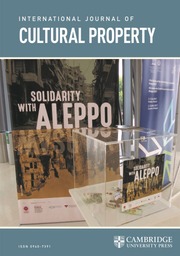Article contents
Heritage 2010: 2nd International Conference on Heritage and Sustainable Development*
Évora, Portugal, 22–26 June, 2010
Published online by Cambridge University Press: 21 February 2011
Extract
Heritage 2010 was a state-of-the-art event regarding the relationship between forms of heritage and the conceptual framework for sustainable development. The four dimensions of sustainable development—environment, economics, society, and culture—were brought together in order to define a particular approach on how to deal with and go beyond the traditional aspects of heritage preservation and safeguarding. As heritage is no longer just a memory or a cultural reference, or even a place or an object, some deeper conceptualization is needed in order to place heritage in its present context. The concept of heritage is moving toward broader and wider scenarios, where it often becomes the driving force for commerce, business, leisure, and educational politics. Heritage is currently seen, or referred to, only through its cultural definition. However, sustainable development brings heritage concepts to another dimension, as it establishes profound relationships with economics, environment, and social aspects. Consequently, heritage preservation and safeguarding is facing new and complex problems. Degradation of heritage sites is not any more just a result of materials ageing or environmental actions. Factors such as global and local pollution, climate change, poverty, religion, tourism, commerce, ideologies, and war are now on the cutting edge for the emerging of new approaches, concerns, and visions on heritage. Thus, the “Heritage 2010: Heritage and Sustainable Development” conference was conceived to embrace a global view on how heritage is being contextualized with the four dimensions of sustainable development. Furthermore, heritage, governance, and education were brought into discussion as the key factors for enlightenment of future global strategies for heritage preservation and safeguarding.
- Type
- Conference Reports
- Information
- Copyright
- Copyright © International Cultural Property Society 2010
References
- 1
- Cited by




